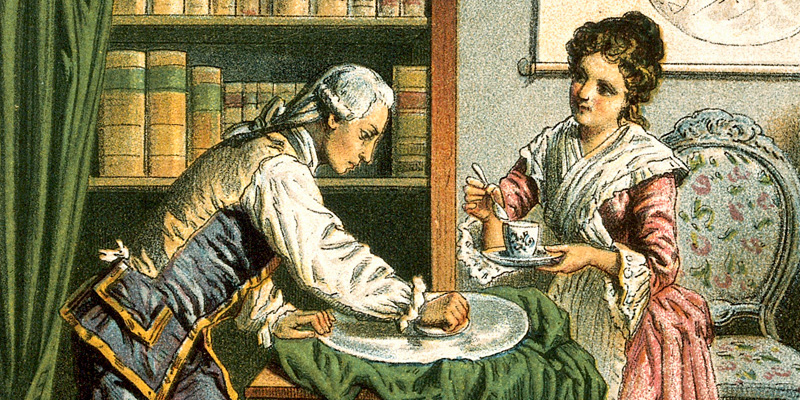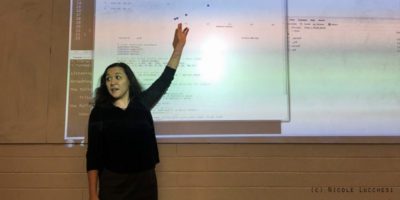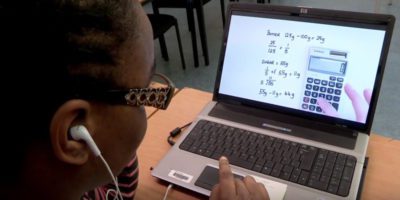June Barrow-Green is a professor of the history of mathematics based in the Department of Maths and Statistics at the Open University. She works mostly in 19th and 20th century mathematics, and amongst other things she is currently looking at the challenges for women studying mathematics in Cambridge in the late 1800s. June is actively involved with numerous organisations including the London Mathematical Society, the International Commission on the History of Mathematics and the British Society for the History of Mathematics.

“…People are so surprised when they meet me as a maths historian, as for them maths was a subject with all the people taken out…”
A slightly strange career trajectory…
I’ve had a slightly strange career trajectory because my parents were rather Victorian in their attitude to education for girls. I didn’t actually go to university until I was 30 because their financial situation was such that they would have had to pay for all my living expenses and they thought it would be a waste of money! I also went to a secondary school (a boarding school) that wasn’t particularly academic, although I always enjoyed academic work because I went to a good primary school and that set me up well for secondary school.
After I left school I went to work in an art gallery on Bond Street in London, for about eight years. Whilst I was there Open University was becoming really quite visible. I thought I was too old to go to a conventional university but I was in a better position to fund my own studies by this point, so I decided to study with the Open University. I began with arts courses because I was working at the gallery, but I also thought it would be fun to do some maths courses because I always liked it at school.
Becoming a full-time maths student
So, I was enjoying studying maths, and I decided I wanted to do more of it, so, almost on a whim, I asked my OU tutor whether it would be possible to do it full time. I was in the fortunate position that I did have A-levels (although my grades weren’t great) which meant I satisfied university admissions requirements, so my Open University tutor recommended that I apply to Kings College London.
I was incredibly fortunate that I had this mad idea at just the right time of year (in October / November) before Kings had started accepting people for their next intake. When I visited the admissions tutor at Kings I thought he was going to tell me it was a nice idea but to go back to the Open University, but he was really welcoming and thought it would be a great idea and because I’d got the A-levels he said I could join the following October.
I did a full-time maths degree and loved it, and while I was doing it we had to write a couple of essays – one in the first year and one in the second year – so I thought I’d like to write about the history of maths. I was curious about where and when mathematics started, where it was going, and also, why it developed in the way that it had, and why some of it seemed rather hard.
Learning about nice and nasty mathematicians
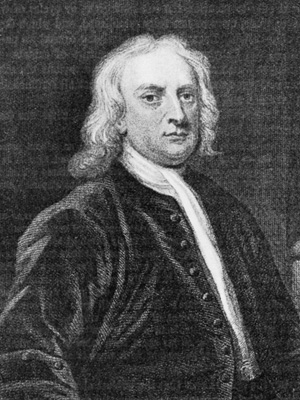
When I was an undergraduate we had calculus tutorials and at the start of the very first one the lecturer looked at us and said: “Isaac Newton, Isaac Newton – the second nastiest person to come out of Grantham.” (This was in the Maggie Thatcher era!) I’d never thought before about mathematicians being nice or nasty. But of course, it makes a difference, as it does in any sphere – whether people are nice or nasty, whether they’re manipulative or not. That’s just life.
This lit a spark for me of wanting to understand how mathematicians really operate, what they were like as human beings, and what other things played into the development of their mathematics. These were such things as philosophical questions, or social questions, or to what extent it involved things like war and politics. I realised that all kinds of things lead into the development of mathematics, but you’re just not aware of that when you’re studying it, especially at school.
So, when I finished my degree I decided I’d like to do a Ph.D. in 19th century maths because that is what makes up a large part of what you study in maths at university. But I wasn’t completely sure whether I wanted to do a PhD because I liked being a student so much. I also needed to shore up my finances, so I got a job in the City for a couple of years, which completely convinced me that I did not want a career in the City!
A return to the Open University
I realised that I needed to do a bit more maths in order to understand the history of 19th century maths, so I did an M.Sc, in Mathematical Physics at Kings. You had to choose five courses from the core, but the other three courses were free choice, so I chose the history of maths course, which was offered at Imperial.
Studying that course completely convinced me that history of mathematics was what I wanted to do for my Ph.D., so then I looked around to see where I could do it, and the obvious place, funnily enough, was the Open University because there History of Mathematics sat in the maths department.
I knew I needed to be with mathematicians. I knew if I was in a humanities department I would never be able to find the right mathematician to help me with the maths. I knew I’d need help and advice. I identified the person at the Open University who I thought would be the ideal Ph.D. supervisor.
He responded and said he’d be happy to meet me in London, and it transpired that he lived about half a mile away from me in Islington, and he didn’t much like traveling to the Open University in Milton Keynes, so the prospect of having a Ph.D. student he could supervise close to home was quite appealing!
Becoming a professor and travelling the world
Serendipity definitely plays a part in life. It worked out brilliantly. It was a fantastic stroke of luck because I got wonderful supervision. (We’re incredibly good friends and he’s only just retired.) After the Ph.D. he managed to get me a postdoc Leverhulme Fellowship at the Open University, and then I secured a few short-term contracts before the Open University finally gave in and gave me a permanent job. They finally gave in completely and made me a professor a couple of years ago!
I’ve got incredibly good colleagues both at the OU and elsewhere, and the job has taken me all over the world, but it wasn’t a career that I planned out. History of maths is quite a niche subject too, so you do get to know most of the people in the community. If you don’t know someone you will know someone else who does. I’ve got friends all over the world now who I’ve met on my academic travels to India, Brazil, America, China, and elsewhere. I’m very fortunate.
Infinite possibilities from using modern technology to collaborate
Modern technology allows mathematicians to collaborate in a way that simply wasn’t possible before. Now several mathematicians can pile in together to prove a theorem that previously would have taken one mathematician a lifetime to prove. Technology also helps us historians of mathematics as we now have access to digitised material which we never even knew existed!
As a mathematician or a historian of mathematics you can go down what turns out to be a wrong alley in the end, but it is going down that alley that helps you understand where the right one is. You don’t always hit the target first off. Sometimes you go down a wrong alley, you end up going in another direction and you solve a different problem.
For children at school going down the wrong alley and making mistakes should be all part of the learning process. There’s a really positive element to it. It shouldn’t be that when you get things wrong that you’re told: “You’re no good at maths.” It’s not about the quantity of maths we do as children, it’s about the quality of the teaching. Children should be taught by people who have a passion and an enthusiasm for maths.
My role on a day to day basis
Because the Open University is a distance learning institution we don’t have undergraduates on the premises, so our courses are written, and as far as my teaching at the Open University is concerned, my day to day job is in writing course material and preparing assessment. I do that on undergraduate and postgraduate courses. We have an M.Sc. in Maths and I work on the dissertation course, which is on the History of 19th Century Geometry. I also supervise Ph.D. students.
I also spend time on my research and there is the inevitable administration. I’m on the Athena SWAN Committee. Athena SWAN is a hugely important and really worthwhile initiative for advancing the careers of women in maths and science. In applying for (and achieving) an Athena SWAN bronze award, we have learnt a lot about ourselves at the Open University.
I’m also passionate about books, particularly old books, so I’m on the Library Committee. Mathematicians like using printed books. You rarely use a book in a linear way when you’re doing maths research so a digital edition is usually not appropriate.
I’m also on the London Mathematical Society Council and I’m their librarian, an honorary post which means I oversee their library, which is housed at UCL, and their archives. One of the other jobs of the librarian is overseeing the artwork displayed at De Morgan House.
Because of the Open University’s legacy in television and radio production I’m also quite often asked to be a consultant on television and radio programmes like In Our Time on Radio 4.
Heroines of maths
Because of the structure of society there were very few women in history who did anything significant in maths, not because there wasn’t the talent there but just because of the way society was structured. Women didn’t have the opportunity to study at university. (For example, it wasn’t until 1947 that the statutes at the University of Cambridge were changed so women could get a degree, so Cambridge didn’t start awarding degrees to women until 1948.)
I’m always cautious about talking about the achievements of women in history of maths because there weren’t that many women who were allowed to do mathematics, but for those who did, almost without exception, they had supportive parents or a supportive family member. (Even at the end of the 19th century there were still people who believed that if women over exerted their brains by doing maths and science then it would affect their ability to bear children..!)
Sofia Kovalevshava
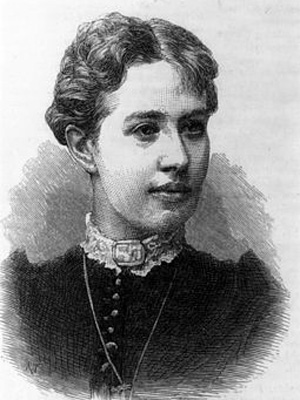
When I was doing my Ph.D., the female mathematician I first encountered, because her name was attached to a theorem, was a Russian woman called Sofia Kovalevskaya. She was remarkable and I quite often talk about her when I go into schools.
She was born in 1850 and she married when she was 18 in what is sometimes described as a ‘fictitious marriage,’ because she wanted to study mathematics and could not do so in Russia, and at the time you couldn’t leave Russia without being with a male escort, be it your father, your brother or your husband. Women couldn’t travel on their own.
At the time, there were men in Russia who were very liberated and were prepared to marry women just so they could escort them out of the country if they wanted to study elsewhere. As a result of her marriage, Sofia was able to study maths in Berlin with Karl Weierstrass, one of the kingpins of mathematical analysis.
For me, why she’s such as good candidate to talk about in schools is because she was not just a mathematician. She wrote plays and novellas, as well as being a campaigner for women’s rights, so she had a combination of lives (including coming to London to visit George Eliot’s salon) and was a really full character. She was also seriously smart mathematically – she won a prestigious prize at the Paris Academy.
Why it’s vital we remember and celebrate female pioneers of maths
People know about Kovalevskaya but there are also unsung women. Many have come to the fore more recently with stories about ‘human computers’, like those in Hidden Figures who are relatively modern, but back in the 18th century there were also female ‘human computers’ who were hidden.
One particular 18th century women, who was discovered by one of my colleagues, worked for the Nautical Almanac Office doing computations and her name didn’t appear in any of the ledgers until after her husband died because the payments were all made to him. The payments only appeared in the books later because they wanted her to carry on and had to pay her!
There are particular women like that but they are few and far between. There are various instances of other people like Caroline Herschel, who helped her brother, William. Mary Somerville is now better known because she’s made it onto the Scottish ten-pound note. There were so few environments in which these women could thrive so it’s important that we remember and celebrate them.
Helping students to visualise how a maths related career
It’s vital to make teachers aware of the career possibilities in maths. It’s a bit more obvious in some of the sciences, but it’s still a challenge, and it’s a particular problem in maths. There are a number of women who are happy to visit schools to chat about their careers in maths and a database of these would help schools to find role models to talk to their students.
There is a great maths careers website for the Institute of Mathematics and its applications. There’s also something called Plus Magazine. They have various interviews with fascinating people and I heard one of the women who runs it, Marianna Freiberger, doing a brilliant careers talk.
I was on the External Advisory Board for the new maths gallery (the Winton Gallery) at the Science Museum in London. They have now displayed maths thematically, so there are different themes like ‘life and death’, alongside ‘form and beauty’ and ‘trade and travel’, so you can see how maths is involved in all these various aspects of your life. The maths isn’t so much in “in your face” that even parents who’ve had a bad experience with maths can go and think: “If my kids can manage to keep going with maths, all these doors can be open to them.”
The big thing with maths is confidence – to have the confidence to make mistakes and to persevere – and it’s important to see that it’s worth persevering with maths to a decent level.
Promoting relationships between maths and other subjects
I haven’t researched this so I don’t have any formal evidence, but my instinctive feeling is that making relationships early between maths and the arts, or maths and anything else has to be a good thing, because one of the things that seems to happen is that maths is seen in isolation, so children don’t see the point of it, and they don’t experience the enjoyment of it.
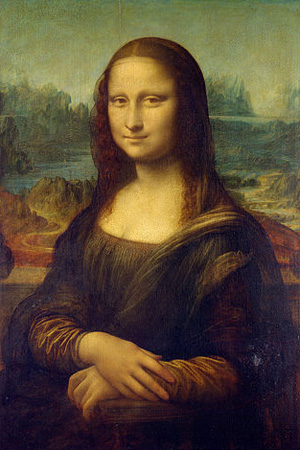
There are well known strong connections between maths and music, and the first mathematics text books came from artists in the 14th and 15th centuries with perspective. We just need to think of people like Leonardo da Vinci and Albrecht Dürer, so there’s a really rich history linking maths and the arts.
Anything that stimulates people’s interest in maths and helps them see it as a much broader subject than just a bunch of numbers that they’re struggling with is helpful. A wonderful example of this is the Sublime Symmetry exhibition that was put together by Sarah Hardy to celebrate the work of the ceramicist William De Morgan.
People are so surprised when they meet me as a maths historian, as for them maths was a subject with all the people taken out. You get theorems that are named after people, and I was always curious about them whilst I was studying. There’s one called the Weierstrass theorem and I remember thinking: “That’s a great name!”
At the time, I didn’t realise that Bolzano and Weirstrass were two different people because even when the theorem is taught, people rarely stop to mention something about the people, even as a digression for a couple of minutes. It’s as if they’re just a label and they don’t mean anything. One of our missions in the history of maths is to go back to the original sources to gain a deeper understanding of the mathematics and the way it developed.
Advice for girls and women who want to study maths
In my case, my parents never imagined that I would do anything anyway, and I was discouraged from going to university. My role in life was intended to be sitting around, looking decorative and getting a husband.
When I worked in the art gallery they had some pretty spectacular pieces like Rubens, Turners and Constables – you name it… Sometimes owners of stately homes would need to sell a valuable painting to help make ends meet, and if they sold it to a national institution there was a good tax kick back. When the gallery discovered that I could add up, one of my jobs was to work out these tax calculations.
It was quite funny because people in the gallery thought I was a maths genius because I could do some pretty elementary adding up and percentages! (Percentages seem to be one of those things that often throw people.) When I told them I was studying a university maths course they were amazed as they didn’t think I could possibly need to know any more maths, but they were very supportive when I decided to go to university.
Overcoming unconscious resistance
I’d say that if you’ve got a passion for something, then you must go with it, because then you’ll succeed and you’ll get pleasure from it. That’s a key thing for me.
Things are definitely better from the point of view of the Government and society in general, but we wouldn’t need to have this conversation if we were in France. For some reason in this country we’ve developed this divide between the two cultures of science and the arts in society.
If you like maths, then persevere. Find a champion who you can talk to about it. And don’t think that maths is just a young person’s game either. Of course, the evidence is there that much of the really startling work has been done by people who are quite young, but there’s still been a lot of fantastic work done by people who are not so young, and you don’t necessarily want to go into maths as the person who’s going to solve the Riemann Hypothesis. If you’re going to get pleasure from contributing in another way, you’re never too old to do it.
You’re pretty unlikely to win Wimbledon if you first pick up a tennis racket when you’re 30, but you can start playing tennis at 30 and have fantastic fun, and become pretty good, and the fact that you haven’t won Wimbledon is not going to spoil your enjoyment. As well as yourself, you’ve probably given a lot of other people a lot of pleasure, and it’s made you fitter and healthier so don’t be put off studying mathematics if you’re starting later just because you didn’t have a good experience when you were at school.
Everybody’s capacity for maths is much, much greater than they believe
Everybody’s capacity for maths is much, much greater than they believe. Quite often when you quiz people about maths they say they really quite enjoyed it at 8, 11 or 13, but then they hit a wall and the particular teacher they had at the time wasn’t able to get them over it. So, if they’d had a different teacher who they got on with better, or they hadn’t had measles and missed those three weeks of teaching, things could have been very different.
When children encounter difficulties, all too often they are told that they haven’t got a maths brain and it doesn’t matter. No-one has tried to find out what has been missed and how to get those bricks into the wall so they can carry on building the house.
If you were doing English and someone said they’d missed out all the words beginning with ‘T’ because they weren’t at that lesson, we wouldn’t say: “Well, that’s OK. You don’t need to bother with reading and writing because you’re no good at it!” We wouldn’t even contemplate it, so why should we do it with maths?
Coming up next
This summer, I’m jointly organising a symposium at the International Congress for the History of Science in Rio, on History of Applied Mathematics, so that’s exciting. Also, along with my colleagues Robin Wilson and Jeremy Gray, (Jeremy was my Ph.D. supervisor), we’re finally getting to the point of publication of our two volume history of maths book. The first volume is almost at proof stage. It’s been a project that’s been going for about ten years, so I can’t wait for it to finally come to fruition!
The maths education department at the Open University is being reinvigorated and we’ve got some new staff so we’re looking into the possibility of producing a course combining the History of Mathematics and Maths Education. I’m really looking forward to having conversations about that because it would be a fascinating course to work on.
Whenever the Open University produce new maths courses, they like to include little bits of history in margin notes etc., and one of my other roles is to write or check them, because there’s a lot of misinformation on the web when it comes to history of maths. The truth is always as good as, if not better than, the fiction.
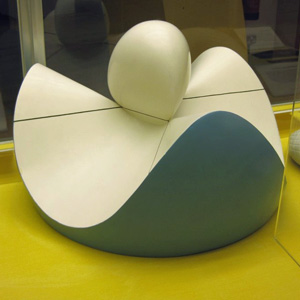
I’ve also been working on the mathematical models of a mathematician called Olaus Henrici, who was a President of the London Mathematical Society in the 19th century. He started off as an engineer but then got into maths and became a strong proponent of projective geometry. I’m looking forward to writing up my research on this. I met someone at a conference in Germany who reproduces 19th century mathematical models on a 3D printer, and he has produced some of the Henrici models for me and I now have my own ‘show and tell’ for my talks on Henrici, so that’s fun too.
http://www.mathematics.open.ac.uk/people/june.barrow-green
https://twitter.com/OUMathsStats
https://www.facebook.com/OUMathsStats/
Sir William Herschel and Caroline Herschel image credit: Wellcome Images [CC BY 2.0 (http://creativecommons.org/licenses/by/2.0)], via Wikimedia Commons
Sir Isaac Newton image credit: Popular Science Monthly
Sonia Kovalevskaia image credit: By “R. T.” [Public domain], via Wikimedia Commons
Mona Lisa image credit: Leonardo da Vinci [Public domain or Public domain], via Wikimedia Commons

